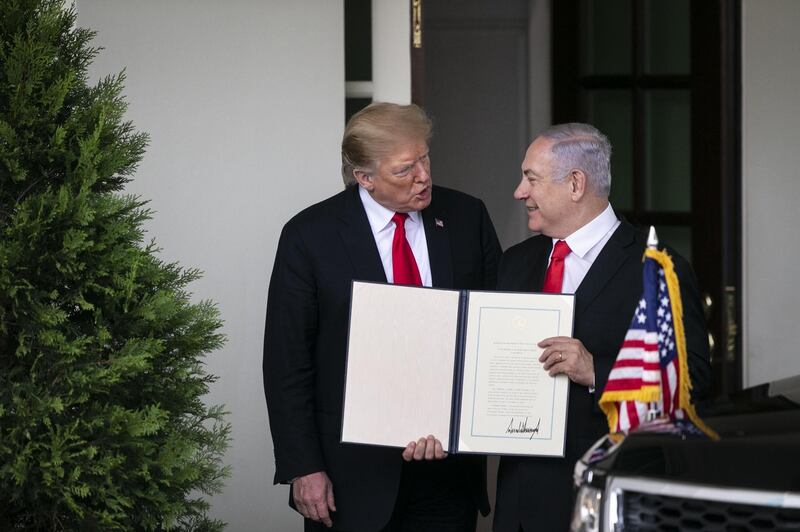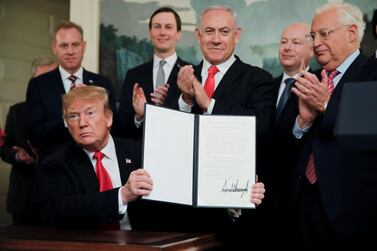The decision to recognise Israeli sovereignty over the Golan Heights will undermine the stability of the Middle East, Arab states said on Tuesday.
The warning followed President Donald Trump on Monday signing a decree granting Israeli sovereignty of the Golan Heights, breaking a long-standing US and international policy. In 1967 Israel seized the territory from Syria during the Six Day War and annexed it in 1981 in a move that has not been internationally recognised.
"This was a long time in the making and should have taken place many decades ago," Mr Trump said while Israeli Prime Minister Benjamin Netanyahu smiled approvingly.
The move is expected to increase the Israeli premier's chances of getting re-elected.
On Tuesday the UAE said that stability and peace will not be achieved as long as “Israel continues its occupation of Palestine and other Arab territories.”
Abu Dhabi reiterated its position in recognising the Golan Heights as a Syrian territory, adding that the decision by Washington “cannot change this reality.”
Syria immediately rejected the decision, calling it a “blatant attack on its sovereignty and territorial integrity”.
Damascus vowed to regain the territory, saying the Golan would remain “Syrian, Arab” and that Mr Trump had shown contempt for international law.
Leaders throughout the Arab world expressed deep regret, saying it will have a “negative” impact on the stability of the region.
Saudi Arabia, a vital US ally, condemned the move as a violation of international law.
The Golan remains "occupied Syrian Arab land" and its recognition as Israeli is a "violation of the UN Charter and international resolutions," the foreign ministry said.
"This will have negative effects on the Middle East peace process and security and stability in the region."
The UN Security Council and previous US administrations described the Golan Heights as occupied territory whose return would be negotiated during a peace deal between Israel and Syria.
Bahrain called on the international community to end Israel’s illegal occupation of the land, stressing the move will preserve stability in the region.
"Bahrain's foreign ministry reaffirms its position that Golan Heights are an Arab and Syrian territories, occupied by Israel since June 1967, as it is confirmed by the resolutions of the UN Security Council," the ministry said.
Iraq refuted the decision and stressed it broke international law and undermined UN resolutions.
“We refuse the Zionist capture of the Golan under any pretext,” Foreign Minister Mohammed Al Hakim said on Twitter.
يعتبر العراق الجولان المحتل أرضا سورية اصيلة ولابد من ارجاعها للسيادة السورية كاملة وحسب قرارات مجلس الأمن ونرفض ضمها الى الكيان الصهيوني تحت أي مبرر.
— M A Alhakim محمد علي الحكيم (@maalhakim) March 25, 2019
Lebanon said the move undermines any efforts to reach peace in the region.
"The Golan Heights are Syrian Arab land, no decision can change this, and no country can revisit history by transferring ownership of land from one country to another," the foreign ministry said in a statement.
Any attempts by Israel to expand its territory by way of "force and aggression" would only isolate the Jewish state, said the statement.
The Arab parliament also rejected Mr Trump's decision.
The US announcement is a clear violation of UN Security Council resolution 242 of 1967 that demanded the withdrawal of Israel from occupied territories including the Golan, the speaker of the Arab Parliament, Dr Mishaal Al Salami said.
Meanwhile the UN said its position on the Golan is unchanged.
"The UN's policy on the Golan is reflected in the relevant resolutions of the Security Council, and that policy, again, has not changed," said Stephane Dujarric, spokesman for the secretary general.
The UN Security Council is expected to discuss this issue on Tuesday during a meeting on renewing the mandate of the UN peacekeeping forces between Israel and Syria in the Golan known as Undof.






